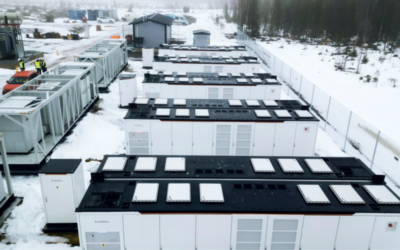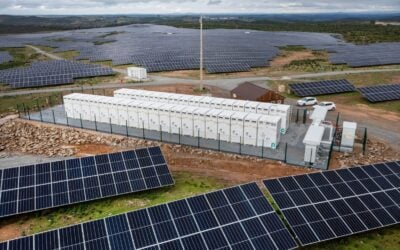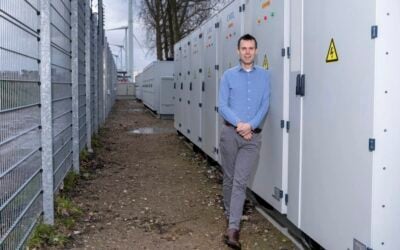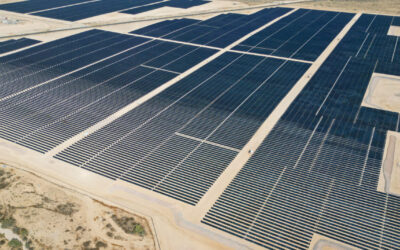Energy Stack - incorporating Aurora systems with the Znyth zinc-hybrid cathode battery technology. Image: Eos Energy Storage.
Engineering multinational Siemens will collaborate with Eos Energy Storage, maker of zinc hybrid cathode-based battery systems, on the integration, installation and servicing of energy storage systems.
Eos produces Aurora 1000|4000, a DC energy storage system of 1MW/4MWh based on its patented Znyth zinc hybrid cathode batteries packaged in a modular product it calls Energy Stack. Jointly with Siemens, the pair has begun production of an energy storage system that includes AC power conversion and controls.
Enjoy 12 months of exclusive analysis
- Regular insight and analysis of the industry’s biggest developments
- In-depth interviews with the industry’s leading figures
- Annual digital subscription to the PV Tech Power journal
- Discounts on Solar Media’s portfolio of events, in-person and virtual
“Our goal is to standardize and productise energy storage projects with focus on reliability and return on investment for the customer. This process starts with modeling and analytics to optimally size the energy storage asset and carries all the way through project implementation and performance guarantees,” Siemens VP Brian Dula said.
Siemens and Eos, which recently raised US$23 million in a funding round and added former First Solar CEO Jim Hughes as chairman of its board of directors, will work together on a number of projects already announced by the energy storage specialist, including a demonstration project at California utility Pacific Gas & Electric (PG&E)’s Smart Grid Lab announced in 2014 and another at the University of California San Diego.
System priced at US$160 per kWh
“We’ve pioneered what we believe to be the lowest cost battery storage on the market,” Eos’ vice president for business development, Philippe Bouchard, told Energy-Storage.News.
“Our flagship numbers are US$160 per kWh price point on the DC system, which turns a lot of heads in the industry…we’ve seen through our scan and evaluation of the market that EOS is coming out 30-40% less expensive than lithium-ion not just on an upfront capital cost basis, but most importantly on a LCOE (levelised cost of energy) basis.”
Bouchard said the battery technology was developed from looking at the various business cases for energy storage and therefore tailor made for many of its applications. The company is gunning for the utility market, with Bouchard emphasising the Eos Aurora’s competitiveness against traditional grid infrastructure.
“We really view our competition not as other batteries, but as conventional generation and copper wire. These assets set an economic benchmark for cost-effectiveness on the electricity grid. As prices continue to drop, batteries will increasingly compliment or supplement gas peakers and enable greater efficiency and utilisation of our existing assets.”
Eos has brought Siemens into what it calls its Aegis programme, where it works with system integrators to incorporate the Aurora system with Siemens’ power conversion and control technologies.
“By combining Eos’ cost and performance advantage with Siemens’ capabilities in system integration and project execution, we are able to offer solutions that reduce risk and complexity for the customer while setting a new benchmark for energy storage reliability and cost-effectiveness,” Eos CEO Michael Oster said.
Quotes from Philippe Bouchard in this article have been updated from those originally published.






